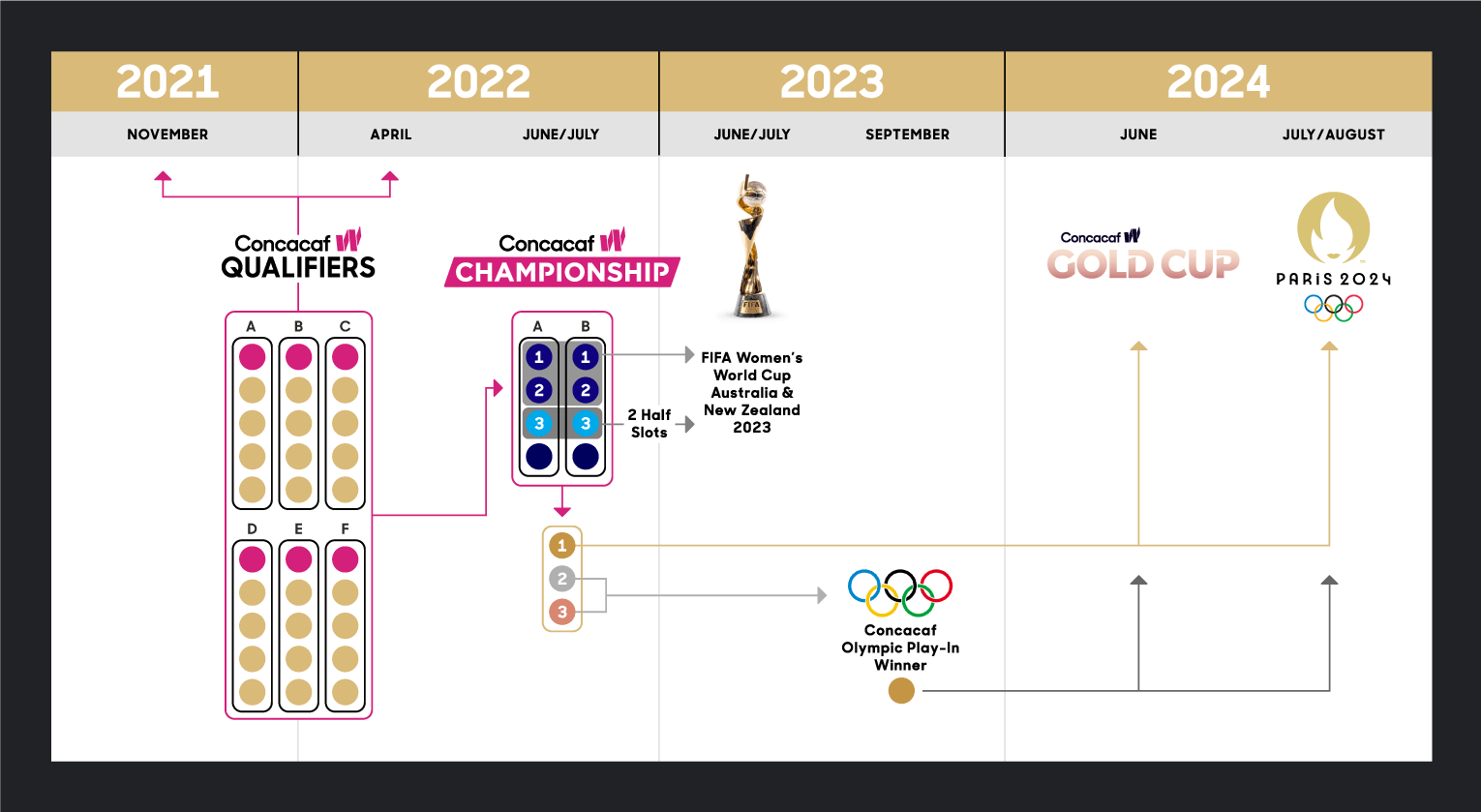
#CANWNT
Qualifiers to the FIFA Women’s World Cup Australia and New Zealand 2023 have kicked off and will run from September 2021 all the way through to February 2023. More than 500 qualification matches will be played in order to determine the 30 nations that will join the hosts Australia and New Zealand who have already qualified for the biggest tournament in the world, which has been expanded to 32 nations for the upcoming edition. That leaves 207 FIFA members with a chance to qualify for the FIFA Women’s World Cup either through their confederation or the new intercontinental ten-nation playoff tournament.
While Europe and Asia get started in September followed by Africa in October, the Concacaf region will get underway in November 2021 with the Concacaf W Qualifiers and culminate with the Concacaf W Championship in July 2022. South Africa and Oceania will both begin their qualifiers in July 2022. Canada have already earned a direct ticket to the new Concacaf W Championship from which four nations will qualify for the FIFA Women’s World Cup and two more will advance to the intercontinental playoff.
Alongside the qualifiers for the FIFA Women’s World Cup Australia and New Zealand 2023, Concacaf have unveiled its revamped format for women’s national team competitions that will be taking place from 2021 through 2024. This new structure will feature two main summer tournaments – the Concacaf W Championship in 2022 and then the Concacaf W Gold Cup in 2024. The first chapters of this revamped format all begins with 30 Concacaf nations competing in the Concacaf W Qualifiers in hope of securing a spot in the 2022 Concacaf W Championship. Both Canada and USA will skip the qualifiers as they have received a bye straight to the Concacaf W Championship for being the top-two ranked Concacaf nations.
A total of eight nations will compete at the 2022 Concacaf W Championship. The tournament will go through a group stage after which it will be the top two finishers of each group that advance to the semifinals and guarantee a spot at the FIFA Women’s World Cup Australia and New Zealand 2023. The two third-place group finishers will advance to the intercontinental playoff for the FIFA World Cup Australia and New Zealand 2023.
It is clear that this launch displays an amazing way to mark Concacaf’s 60th anniversary. The new format and launch of two new summer tournaments is also an ideal way to mark the 30th anniversary of the first ever Concacaf Women’s Championship.
“These new competitions will be game-changing for women’s football in Concacaf,” said Karina LeBlanc, Concacaf Head of Women’s Football. “We are providing a platform for women footballers in Concacaf to thrive and for women and girls throughout the region to support their national teams with pride.”
The words of Karina LeBlanc hold true in the sense that these new competitions will be game changers for both women footballers and in elevating women’s football. Simply put, it is a new platform in which women’s football can thrive. In perspective, these new competitions for Canada will provide women, girls and fans from all over the region another opportunity to get behind their Olympic champions on the road to the FIFA Women’s World Cup Australia and New Zealand 2023.
Story by Rania Elhilali
CANADA SOCCER’S WOMEN’S NATIONAL TEAM
Canada are Olympic champions (Tokyo 2020), two-time bronze medal winners (2012 and 2016), and two-time Concacaf champions (1998 and 2010). In all, Canada have participated in seven consecutive editions of the FIFA Women’s World Cup™ (1995 to 2019) and four consecutive editions of the Women’s Olympic Football Tournament (2008 to 2021). At Tokyo 2020, Canada Soccer’s Women’s National Team became the first Canadian team to win three consecutive medals at the Summer Olympic Games and just the third nation in the world to win three medals in women’s soccer.
Canada Soccer’s Women’s National Youth Teams, meanwhile, have won four Concacaf youth titles: the 2004 and 2008 Concacaf Women’s Under-20 Championship, the 2010 Concacaf Women’s Under-17 Championship, and the 2014 Concacaf Girls’ Under-15 Championship. Canada have qualified for seven editions of the FIFA U-20 Women’s World Cup (including a silver medal at Canada 2002) and all six editions of the FIFA U-17 Women’s World Cup (including a fourth-place finish at Uruguay 2018).